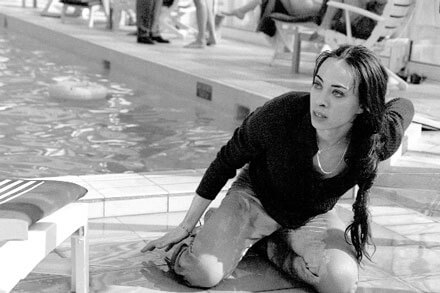Marina de Van’s startling “In My Skin” examines the pursuit of pain
There’s a film theory mindset that says by culling from a large sample of a nation’s cinema you can divine what’s happening in that country. The theory was best illustrated in the book “From Caligari to Hitler,” in which author Siegfried Kracauer argued that Germany’s need for a fascist leader becomes clear from a study of its post-World War I cinema, beginning with “The Cabinet of Dr. Caligari” (1919) in which Cesare the sleepwalker does horrible things under the command of the mesmerist Caligari.
Fast forward to millennium-era France. If you look at the films France is producing today, you will see a strong trend for examining mental illness. In “Come Undone,” the lead male character starts out putting a dead bird in his pocket, and completely unspools when a summer fling doesn’t last. In “Bad Company,” a teenage girl obsesses about her dead sister, while in “Fat Girl,” the pretty older girl is more than happy to get date raped in front of her 12-year-old sister. Claude Chabrol’s recent films have featured one murderess in denial and another woman blithely putting the past behind her by taking the blame for someone else’s murder. Francois Ozon’s films always features something no quite right. Who can forget the scene in “Criminal Lovers “where the crazed woodsman rapes the young man while his girlfriend, chained up and in a makeshift dungeon, is forced to watch.
I think I have made my point.
So it comes as no surprise that the year’s most shocking and thought-provoking film should come to us from France. “In My Skin,” written and directed by Ozon collaborator Marina de Van features Esther, a marketing analyst who is on the rise, with wonderful things happening in her life, yet deep down she is disturbed. While attending a party with co-workers, Esther, who is played by de Van, wanders into a dark backyard and wounds herself on some tools left there by workmen, but doesn’t realize the extent of her cuts until she goes to the bathroom. De Van offers a loving, yet grisly close-up of the horrible wounds up and down Esther’s lower leg. Rather than ask for help, an embarrassed Esther cleans up the blood as best she can and stays at the party for several more hours, before finally going to a clinic.
At the clinic, the doctor is shocked that she doesn’t feel the wound, but his response seems more mocking than concerned. That reaction is repeated throughout the film as her boyfriend, boss, and friend all learn about Esther’s wound.
As the movie progresses, Esther becomes addicted to re-opening the wound, causing other wounds to other parts of her body, too. The camera records her fetishistic obsession as she starts inflicting more and more damage on herself, going so far as to spend a day or two at a hotel carving out bits of her own skin, which she then chews on as if it were a caramel.
This is tough stuff indeed, but if you are willing to hang in there, you will learn how the masochism relates to the disturbances in Esther’s soul.
At a business dinner, Esther’s mind wanders and she imagines her arm has been severed. While everyone else talks shop, she tries to put her arm back in place without anyone noticing. What her companions do notice is that she is distracted, and at one point she runs off to the wine cellar to cut herself open. Her boss’s only reaction the next day is to say, “I know you, but if this happens again, it could mean a demotion or firing.”
Her boyfriend, also “knowing her,” sees plain evidence of her self-inflicted orgy of wounds, but blithely nods as she tells an unconvincing cover story about being in a car accident. Everyone in her life, it seems, “knows her,” but each of them finishes the sentences with “I know you wouldn’t do this on purpose.”
So Esther’s self-mutilation goes further and further, with no help forthcoming from her loved ones. This self-loathing is acted out at a time when she’s gotten a promotion and she and her boyfriend are buying a house to renovate. The successes in her life are at best superficial and incomplete salves to whatever it is that ails her.
Tens of thousands of people died in France’s record heat this summer, many because children, relatives, neighbors, and hospital personnel headed to the beach for the month of August, leaving behind an old, vulnerable population that included many shut-ins. A recent survey shows that Western Europeans expect the government––not the family nor the rich––to look after those most in need in society.
Characters like Esther are not common in real life, but Marina de Van uses Esther as commentary on a national psyche. Something’s eating at the superficially happy bourgeoisie over there in France, but society, like Esther’s friends and family, would rather stay in denial. Why Esther is doing herself harm isn’t really the point; why no one is trying to offer real assistance is.



































